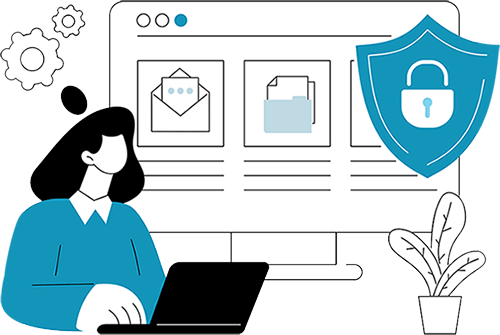I get this question asked a lot, especially from small business owners.
“Why would a hacker go after my website?
There’s nothing here worth stealing.”
I totally get that. But here’s the thing: they’re not targeting you personally. They’re just running automated tools that scan thousands of websites looking for weak spots. If your website isn’t protected, it becomes an easy target, no matter how small your business is.

Think of it this way…
A few years ago, there were several car break-ins in my neighbourhood. No alarms, no smashed windows, but items were stolen. It turned out that a group of teenagers went from driveway to driveway, trying door handles. If a door opened, they took whatever they could find.
That’s exactly what hackers do. They create software that goes from website to website, checking for any open doors or windows. Instead of walking around, they click a button and scan the whole internet.
Once they get in, they can do all sorts of damage. Not just to your website, but also to your visitors. Here’s what they often try to do:
- Use your server to secretly run hidden software, such as tools for mining cryptocurrency or performing other resource-intensive tasks.
- Send spam emails through your hosting account without you knowing.
- Add dodgy links or content to your pages; think fake products or adult content.
- Install malware that could infect anyone visiting your website, especially users with outdated browsers or software.
Even if it wasn’t your fault, it can hurt your business’s reputation. If someone visits your site and gets a virus or sees inappropriate content, it reflects poorly on you.
It’s not just about your website; it also damages your search engine rankings. You disappear from Google and lose your Google Business Profile. All that hard work for your 5-star reviews—gone.
It can also:
- Display warnings in browsers, such as “This site may be hacked” or “Deceptive site ahead.”
- Block customers from visiting your website, especially if they use Chrome or Safari.
- Get your domain blocked by email providers, which means your emails may not reach inboxes.
- Take hours or days to fix, if it can be fixed at all, and can be costly if you don’t have backups.
What I do to keep my clients’ websites safe
Security isn’t a one-off thing; it’s something I stay on top of every day. I build everything using clean, modern code. 20 years of WordPress experience teach you a thing or two. Here’s what I’ve put in place for my clients:
- Secure hosting – WordPress-specific hosting with serious security. No risky shared servers.
- Locked-down WordPress core – No one can sneak in and overwrite the core files.
- Strong passwords only – Weak passwords don’t stand a chance.
- Nightly backups – Backups run every night, off-site, and don’t rely on a plugin.
- 24/7 monitoring – Websites are monitored around the clock for any suspicious activity.
- Login protection – Block brute-force login attempts before they can break in.
- Smart IP blocking – Hackers are automatically blocked before they can even try.
Website security is part of the WordPress Management Plan I offer. This lets my clients run their business without stress.
